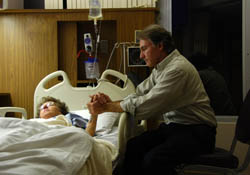Better care for the end of life
Cancer is a leading cause of death worldwide, especially among older people, causing much pain and suffering in advanced cancer and towards the end of life. While many efforts are underway to improve therapy and treatment options for this multifaceted disease, clinicians are underlining the need to also raise the quality of care for people with advanced cancer and at the end of life. The EU-funded project 'Reflecting European priorities for research and measurement in end of life care' (PRISMA) sought to meet this challenge. The project aimed to identify best care practices, and improve and harmonise research in the field through a comparison and exchange of approaches and experiences in measuring and researching priorities. Bringing together 11 organisations and participants from 36 countries, the project studied key issues that affect end-of-life care, such as culture, public preferences and priorities of European citizens when considering how they would like to be cared for in advanced disease. It also examined policy development and long-term care settings involvement in palliative and terminal cancer care, and at best clinical research methods. Among its key achievements, PRISMA successfully mapped end-of-life care challenges and priorities for care and research across different countries in Europe. It identified and harmonised practices and experiences in end-of-life cancer care measurement and quality indicators, in addition to developing online resources to upgrade research on the topic. Dissemination of the project outcomes was successfully achieved through stakeholder meetings, academic papers, online resources and in-depth reports. The final project conference in Belgium also helped enlighten stakeholders on the project's outcomes, reaching policymakers, clinicians, politicians and academicians, among others. Several key recommendations emerged from the projectthatstrongly promoted better end-of-life care in Europe. The outcomes emphasised the need to include core measures across different settings, such as those based on the Palliative care Outcome Scale (POS). The project produced new guidance on the application of POS into practice to improve care, and developed and tested a newsymptom card that is suitable for use in general oncology practice. PRISMA also called on policymakers and clinical services to facilitate the routine measurement of patient symptoms and implement improvements in patient-reported outcomes, so that patients experiencing these problems can be identified more easily and referred appropriately. PRISMA conducted a large cross national survey – and asked about where people, if they had terminal cancer, would want to die. The majority preferred home, with hospice or a specialist palliative care unit coming second. Lastly, PRISMA raised the issue of supporting research funding in end-of-life care and palliative care to advance research, science and innovation within Europe in response to its ageing population and rising number of cancer deaths. If these guidelines are heeded, the EU can emerge as a pioneer in this field, improving the quality of life among European populations who have increasing need for appropriate, quality care at the end of life.







